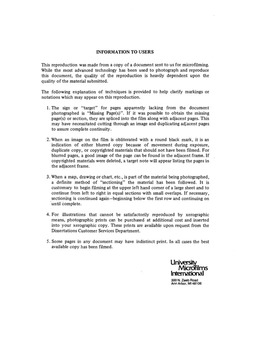| dc.contributor.author | Caldwell, Brenda Sue, | en_US |
| dc.date.accessioned | 2013-08-16T12:28:53Z | |
| dc.date.available | 2013-08-16T12:28:53Z | |
| dc.date.issued | 1983 | en_US |
| dc.identifier.uri | https://hdl.handle.net/11244/5109 | |
| dc.description.abstract | Yet Cowley never completed a synthesis of his own thought. This research provides a biographical sketch of his controversial life, an analysis of his scholarly contributions, and a synthesis of his thought. | en_US |
| dc.description.abstract | Cowley set out single-handedly to organize the field systematically and make it a discipline. To study the college and university and social institutions, he proposed a taxonomy which focused on the constant attributes, structure and functions. He failed to establish a discipline and his refusal to publish severely limited his impact on the field. His collection is his legacy to the study of higher education. | en_US |
| dc.description.abstract | W. H. Cowley (1899-1978) devoted his life to higher education. As a Dartmouth student editor seeking educational reform, he inspired The Dartmouth Report. While earning a Ph.D. in psychology at the University of Chicago, he organized that institution's first office of student personnel services. As head of the student personnel research unit at Ohio State University, he promulgated the belief that the primary aim of education is the student's intellectual, social, and physical development. From 1930-1938, his editorials in The Journal of Higher Education acted as a national forum for developments and issues. As President of Hamilton College, he envisioned the institution as the embodiment of holism. Though only partially effected, his vision was incorporated in the 1945 Harvard Report, General Education in a Free Society. While a professor at Stanford, he became one of the field's foremost scholars and was called to the first endowed chair for the study of higher education, the David Jacks professorship of Higher Education. | en_US |
| dc.description.abstract | The major foci of his work lies in student personnel administration, the history of higher education, and college and university government. He was a pioneer in student personnel and the 1937 Student Personnel Point of View gave expression to Cowley's holism and laid the philosophical base for the field. He sought to synthesize the wealth of historical forces which had shaped the college and university. Yet his study of academic government reflected the organizational patterns in existence when the American college and university matured in the early twentieth century. | en_US |
| dc.format.extent | xiii, 310 leaves ; | en_US |
| dc.subject | Education, Higher. | en_US |
| dc.title | W.H. Cowley : | en_US |
| dc.type | Thesis | en_US |
| dc.thesis.degree | Ph.D. | en_US |
| dc.thesis.degreeDiscipline | Jeannine Rainbolt College of Education | en_US |
| dc.note | Source: Dissertation Abstracts International, Volume: 44-03, Section: A, page: 0680. | en_US |
| ou.identifier | (UMI)AAI8314759 | en_US |
| ou.group | Jeannine Rainbolt College of Education | |
